- Home
- Robert Goddard
Blood Count
Blood Count Read online
About the Book
There’s no such thing as easy money. As surgeon Edward Hammond is about to find out. Thirteen years ago he performed a life-saving operation on Serbian gangster Dragan Gazi. Now Gazi is standing trial for war crimes at the international court in The Hague. After Hammond saved his life, Gazi’s men went on to slaughter thousands in the Balkan civil wars.
Gazi’s family have a favour to ask: in exchange for keeping Hammond’s dirty little secret – and a bigger secret he hadn’t even realized he was implicated in – they want him to find the man who holds the key to all the money Gazi squirrelled away before his arrest. But Italian financier Marco Piravani doesn’t want to be found, not by Hammond, not by anyone. No sooner has Hammond tracked him down than he disappears again. Hammond has no choice but to set off in pursuit.
The trail leads first to The Hague, where he makes an unlikely ally of Gazi’s former mistress, Zineta Perovíc. They head for Italy, in search of Piravani, then Switzerland, where the money may be hidden, before Hammond is forced to return to Belgrade. There he must confront the bloody legacy of Gazi’s career – and his share of the blame for it.
Blood Count is not only a brilliant, race-against-time thriller but also a penetrating examination of cause and effect. In this novel, every action has a consequence and every question must have an answer. Only then will Hammond be able to lay the past to rest …
Contents
Cover
About the Book
Title Page
Chapter One
Chapter Two
Chapter Three
Chapter Four
Chapter Five
Chapter Six
Chapter Seven
Chapter Eight
Chapter Nine
Chapter Ten
Chapter Eleven
Chapter Twelve
Chapter Thirteen
Chapter Fourteen
Chapter Fifteen
Chapter Sixteen
Chapter Seventeen
Chapter Eighteen
Chapter Nineteen
Chapter Twenty
Chapter Twenty-One
Chapter Twenty-Two
Chapter Twenty-Three
Chapter Twenty-Four
Chapter Twenty-Five
Chapter Twenty-Six
Chapter Twenty-Seven
Chapter Twenty-Eight
Chapter Twenty-Nine
Chapter Thirty
Chapter Thirty-One
Chapter Thirty-Two
Chapter Thirty-Three
Chapter Thirty-Four
Chapter Thirty-Five
Chapter Thirty-Six
Chapter Thirty-Seven
Author’s Note
About the Author
Also by Robert Goddard
Copyright
BLOOD COUNT
Robert Goddard
ONE
‘The holiday starts here,’ Edward Hammond murmured to himself. He took a sip of sparkling mineral water and gazed idly across the club lounge, out through the wide windows at the gated and taxiing aircraft on the runway. Heathrow, on a grey February afternoon, made for an uninspiring vista, but Hammond’s sights were already set on the ski slopes of Austria, where conditions, according to the newspaper, were outstanding: superb powder at Obergurgl, no less.
Peter and Julie were already in Austria, in the middle of a fortnight’s break. Hammond had spoken to Julie last night and learnt for the first time that a friend called Sophie had joined them. This sounded to him suspiciously like a matchmaking ploy – not the first such effort on Julie’s part to find him a wife during the thirteen years that had passed since Kate’s death. Maybe something would happen between him and Sophie, maybe not, but marriage was certainly not on the horizon as far as he was concerned.
He was aware, of course, that he was more than averagely good-looking for a man of fifty-two. He went to some lengths (twenty in the pool, for starters) to keep himself so and had ample evidence of his attractiveness to women. His wealth and his status in the world qualified him as a desirable catch. But he did not wish to be caught. Marriage to Kate, and the manner of its ending, had left him wary of long-term relationships. Their daughter, Alice, now halfway through her first year at university, had often assured him she would not stand in his way. ‘I only want you to be happy, Dad.’ And that was what he always claimed and generally believed himself to be: happy – up to a point.
A man’s state of mind, a psychiatrist friend had once told him, hinges on his ability to compromise between what is worth remembering and what is best forgotten; between what can be controlled and what cannot. It was a precept Hammond had tried to live by. One of the things besides the state of the Alpine ski resorts he had looked for in the newspaper was a name he knew he would eventually see in a headline. But the name had not been there. The proceedings he assumed were still continuing in The Hague did not currently merit the media’s attention. And for that, at the outset of his much needed holiday, he was duly grateful.
But his gratitude was on a short lease. It ended, though he did not at first realize it, when someone close by said, ‘Dr Hammond?’
He opened his eyes to find a tall, curvaceous, strikingly attractive young woman standing in front of him. She was olive-skinned and dark-haired, dressed clingingly in black, with glittering jewellery and generous cleavage vying for his attention. She had a drink in one hand and a carry-on bag in the other. A smile might have been expected to complete the package, whatever exactly the package was, but she was not smiling. Quite the contrary. She looked as if smiling was the last thing she intended to do.
‘May I join you?’ There was an accent – Spanish, he would have guessed – wrapped round the huskily spoken English.
‘Certainly. Do we …’ She sat down in the vacant chair next to his, dropping the bag at her feet. The ice clinked in her glass and the dangling hoops of her earrings chimed faintly in unison. ‘Do we know each other?’ If she had ever been a patient of his, he felt sure he would remember. But nothing stirred in his memory.
‘I have seen you before.’ She took a sip of her drink – it smelt like brandy – and clunked the glass down beside his. ‘But we have never talked to each other. Until now.’ She was breathing rapidly, he noticed. She was nervous, though what about he could not imagine.
‘Where did you … see me before?’
‘Belgrade.’ She cleared her throat. ‘Thirteen years ago.’
‘Really?’ He hoped he sounded airily unconcerned, though in truth he wished she had said anywhere else at any other time. His trip to Belgrade in the spring of 1996 was not something he welcomed any reminders of. The man he had gone there to treat was now being tried in The Hague. His crimes could in no sense be laid at Hammond’s door. And yet … ‘I don’t … recall the occasion,’ he said, smiling casually.
‘My name is Ingrid Hurtado-Gazi, Dr Hammond,’ she said quietly. ‘I am Dragan Gazi’s daughter.’
He was not often lost for words. A facility for fluent and reassuring phrase-making was one of the strengths of his consulting-room manner. But it had deserted him now. He simply did not know what to say. Though he did know that silence was not an option. ‘I see. Right. Of course. Well …’
‘When I saw you come in, I could not … believe my luck.’
‘Your luck?’
‘I have a problem. A big problem. That is, my family does. We need help. From someone … we can rely on.’
‘Is your father ill?’ It would not have surprised Hammond to learn that he was, though there had been no mention of it in the reports of his arrest last year.
‘No. He is well. He is in a bad place. But … he is well.’
‘Then, what …’
‘Come over to the window.’ Sh
e nodded towards it, then cast an eloquent glance round at the smattering of people near by. The spot she was suggesting put them at a safer distance from potential eavesdroppers. And she was clearly certain Hammond would value such safety.
‘All right.’
They rose and moved to the window. Their ghostly reflections hovered between them and the blank grey sky, into which a plane was languidly rising. But there was nothing languid about Hammond’s thoughts. They were racing to find a way out of an encounter that was already uncomfortable and might, he sensed, become far worse than that. It had been a mistake ever to go to Belgrade. He had been extravagantly rewarded, but he could not say now where the money had gone. He always maintained that the character of a patient is irrelevant. But he did not really believe it. In Gazi’s case, how could he?
‘Where are you travelling to?’ he asked, determined to retain an unflustered air as long as possible.
‘Madrid. I have aunts and uncles there. It will be good to see them before I go home.’
‘And home is?’
‘Buenos Aires. Papá married my mother during his years in Argentina. Maybe he spoke to you about his time there?’
‘No. He didn’t.’ Nor had he spoken about the persecutions, deportations, imprisonments, expropriations and exterminations that would later lead to his indictment by the International Criminal Tribunal for the former Yugoslavia. He had not spoken. And Hammond had not asked.
‘Where are you planning to go, Dr Hammond?’
‘Ski-ing in Austria.’
She fell silent and looked away, out through the window. Then her full attention switched back to him. ‘I am sorry.’
‘About what?’
‘The chance of our meeting. Good for me. Not so good for you.’
‘What?’ He wondered if he had misheard. But he knew he had not. And he was beginning to doubt that their meeting was any kind of chance.
‘I need you to do something for me. For my father. For my family.’
‘I don’t think I can help you.’
‘I have not told you what it is yet.’
‘No. But, as you see, I’m going away on holiday.’
‘No, doctor. You must stay here. In England.’
‘I beg your pardon?’
‘I am sorry.’
Hammond looked her in the eye. ‘I really can’t help you.’
‘Will you at least let me tell you what I need you to do?’ She touched his arm. ‘It will not take long. Just listen to me. Please.’
Her soft, pleading tone and the stirrings of curiosity within him won Hammond over. He would hear her out. And then he would turn her down. ‘All right. Tell me.’
‘As you know, my father is a rich man,’ she said, lowering her voice and leaning towards him until she was almost whispering in his ear. ‘But his money is hidden. It has to be. The Serbian government – and other people – would like to steal it from him. He wants us – his family – to have it. It is controlled by a man who used to work for him. We call him the Accountant. He lives here. In London. He can release the money to us.’
‘Ask him to, then.’
‘We have. But he has not replied to our messages. I do not know why.’
‘Go and see him.’
‘I cannot. I am followed everywhere. If they found out who the Accountant is, we would lose everything.’
‘You’re being followed?’ Hammond glanced over his shoulder. No one in the lounge appeared to be paying them the slightest attention. Was the woman paranoid?
‘It is true, Dr Hammond. I am safe here, in this room, but they were on my tail as far as check-in and they will have someone waiting for me in Madrid.’
‘Seriously?’
‘If it was not true, I would not have to ask you to contact the Accountant for me.’
So they had come to the crux of the matter. She wanted him to act as her courier in order to lay hands on her father’s money, most of which he had doubtless stolen in the first place. It was worse than Hammond might have imagined. And he had no intention of complying. He shook his head. ‘I’m sorry, but—’
‘If you refuse, my father will say things about you at his trial that you will not want him to say.’
Her perfume was sweet, gardenia-scented. Was it only in his imagination that there was a tang of decay, of death, hovering behind it? He could not be sure. ‘Your father can say whatever he likes. I’ve nothing to reproach myself for.’
‘He has told me, Dr Hammond.’ Her expression was unflinchingly serious. ‘I know.’
‘What do you know?’
‘That part of your fee for treating my father was the murder of your wife.’
Hammond’s initial reaction to Ingrid Hurtado-Gazi’s bizarre statement was akin to an out-of-body experience, except that the dislocation was temporal rather than spatial. He could not actually remember when someone had last mentioned the nature of Kate’s death to him. Murder in all its brutal reality bred a reticence that time only entrenched. But now, at Ingrid’s few words, he was transported back in his mind to the early months of 1996 and all the chaos and anger and tragedy that they had contained.
The rapture of his first few years with Kate should, ironically, have warned him. Funny, infuriating, beautiful, electrifying, clever, passionate and energetic, Kate believed life could be an endless game. Marriage and motherhood were always likely to test her tolerance, devoted though she was to Alice. Her affair with Alan Kendall was in some senses a predictable response. It made her, as she freely admitted, ‘feel more alive’. But she was never one for half measures, or for living a lie. She wanted a divorce. She wanted a fresh start.
Hammond moved out of their house in Wimbledon into a rented flat across the Common and embarked on a half-hearted affair of his own. The divorce negotiations became acrimonious. Haggling over money soured the discussions. His existence was miserable – and it promised to grow more miserable still.
That was when Svetozar Miljanović, a Serbian liver specialist Hammond had met at a conference some years previously, contacted him with a lucrative proposition. Dragan Gazi, a powerful figure in the Milošević regime, was in urgent need of a liver transplant. Hammond’s team at St George’s was one of the best by anyone’s analysis. The Dayton Peace Accord had brought a lifting of international sanctions against Serbia. There were no official obstacles to them going to Belgrade to treat Gazi. And Hammond could virtually name his own fee. It was money he had every reason to think he could avoid disclosing to Kate’s lawyer. He accepted.
He took an anaesthetist, a perfusionist and a theatre sister to Belgrade with him. They were there for ten days. The transplant itself went well. They were all too busy – and well-paid – to dwell on the war in Bosnia and Gazi’s role in it. Hammond could not have denied finding it exhilarating to be sought out for his lifesaving expertise and then to demonstrate it so successfully. There was something almost military about the efficiency and precision of what he and his team did.
A week after their return to London, Kate was murdered in a supermarket car park. A mugging gone wrong was the police’s best guess, or the motiveless act of a madman. They checked Hammond’s whereabouts at the time, but never seriously suggested they suspected him of involvement. He was distraught, Kate’s death forcing him to realize he had never stopped loving her. He held himself together largely for Alice’s sake. As the weeks and months passed, he lost hope that the police would ever find Kate’s killer.
Miljanović reported periodically on Gazi’s recovery. He was doing well. From Gazi himself there was no word.
Until now, indirectly, through his softly-spoken daughter, who gazed sombrely at Hammond in the pewter-grey light of the present day, awaiting his response.
‘This … is … utter nonsense.’ The words came stumbling out of him.
Ingrid shook her head. ‘Not according to my father.’
‘He had nothing to do with my wife’s death. There was no … deal of any kind.’
‘He says ther
e was.’
‘It’s a lie.’
‘But your wife is dead. And the killer has never been found. Why should my father admit he is responsible if he is not?’
Why indeed? That was a question to which there were only dark and disturbing answers.
‘I believe my father, Dr Hammond. I think others will too. You have colleagues, friends, a family. How will they take this? You can deny it, of course. But will your denial convince them?’
God, what about Alice? Would she wonder if her father might have been capable, in the throes of a bitter divorce, of commissioning her mother’s murder? Would the care and the love he had put into her upbringing be sufficient to banish her every doubt?
‘Maybe there will not be enough for the police to act on. But there will be enough for suspicion. And that is all it takes to ruin a man in your position.’
That much was horribly plausible. There were always people willing to believe a lie, especially as cunning a one as this. And just how big a lie was it? Had Gazi really ordered Kate’s killing, for some warped reason of his own? Had he foreseen the need to have a hold on Hammond? Had he anticipated that one day he might find it convenient to be able to force his surgeon to do his bidding?
‘My father will say nothing if you help me. Contact the Accountant. Arrange for the money to be released. That is all I am asking you to do. It is a simple thing, easy for you to accomplish. You would be foolish to refuse.’
Simple? Easy? Maybe. Maybe not. Hammond felt as if quicksand was sucking at his feet. If he stood still, he would sink. But the way out led only deeper in.
‘Well, Dr Hammond?’
TWO
Svetozar Miljanović was a small, animated man, built like a jockey, with a smile ever at the ready to transform his features. Only when he forgot himself did the melancholy and weariness emerge. And even then it required a trained eye to notice them.
Edward Hammond possessed such an eye. It was part of his diagnostic technique. Most diseases, according to his GP father, were apparent before a patient described a single symptom. It was all there, in the face, the hands, the posture. You only needed to be able to see.

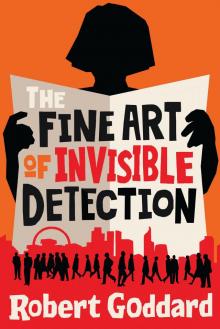 The Fine Art of Invisible Detection
The Fine Art of Invisible Detection One False Move
One False Move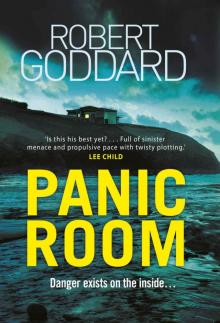 Panic Room
Panic Room Beyond Recall
Beyond Recall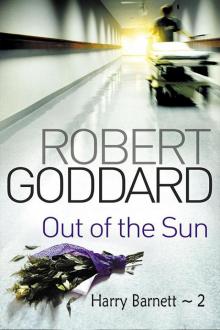 Out of the Sun
Out of the Sun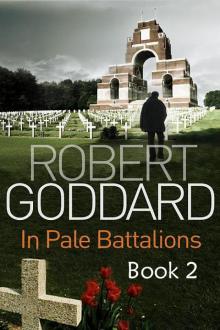 In Pale Battalions - Retail
In Pale Battalions - Retail Painting The Darkness - Retail
Painting The Darkness - Retail The Corners of the Globe
The Corners of the Globe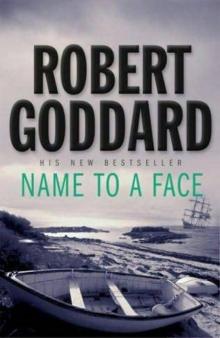 Name To a Face
Name To a Face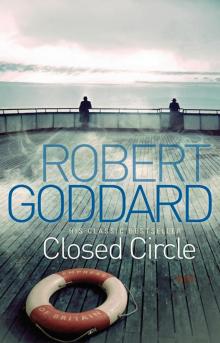 Closed Circle
Closed Circle Caught In the Light
Caught In the Light Into the Blue
Into the Blue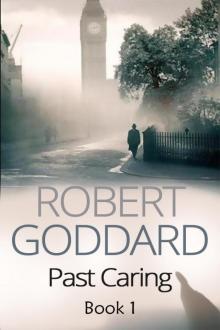 Past Caring - Retail
Past Caring - Retail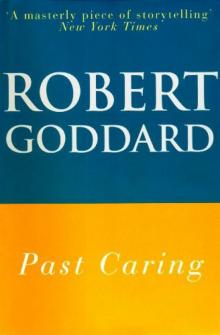 Past Caring
Past Caring Hand In Glove - Retail
Hand In Glove - Retail Borrowed Time
Borrowed Time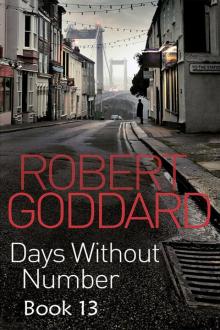 Days Without Number
Days Without Number James Maxted 03 The Ends of the Earth
James Maxted 03 The Ends of the Earth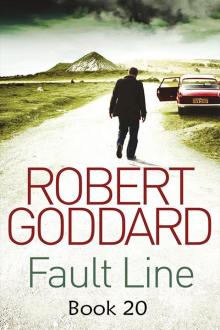 Fault Line - Retail
Fault Line - Retail Play to the End
Play to the End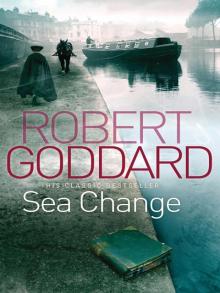 Sea Change
Sea Change Never Go Back
Never Go Back Take No Farewell - Retail
Take No Farewell - Retail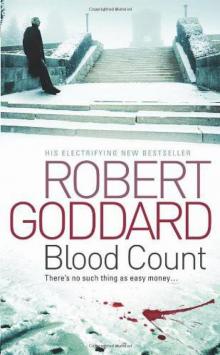 Blood Count
Blood Count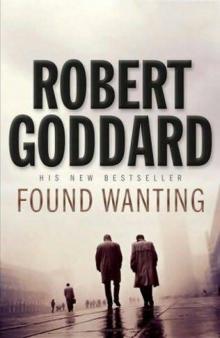 Found Wanting
Found Wanting Sight Unseen
Sight Unseen Hand in Glove
Hand in Glove The Ways of the World
The Ways of the World